Date: 23/06/2022 to 25/06/2022, Vivekananda Law College, Puttur
Today the profession of teaching has become quite challenging because of the latest technological development. The trend in the teaching profession is in changing scenario, and the teachers are expected to be more effective in teaching, evaluating and research. Being a teacher is not just about communicating knowledge, it is about making sure that the students truly integrate this knowledge and derive learning out of it. Any teaching that does not result in effective learning is useless. Hence the periodical faculty development programme for the teachers is in high need, to continuously upgrade him/her in teaching and research. Therefore, the present Faculty Development Programme (FDP) initiated and aimed to enhance the teaching and research skill of the faculty from the discipline of Law.
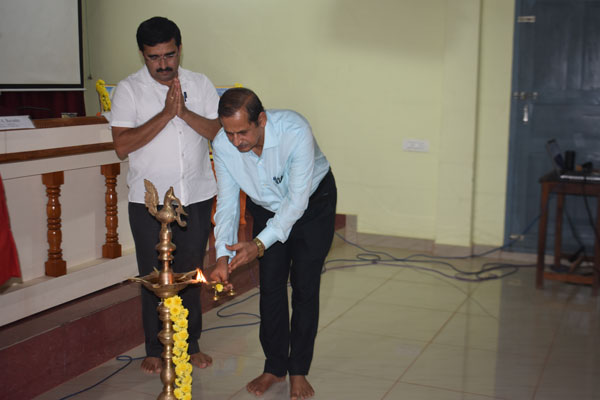
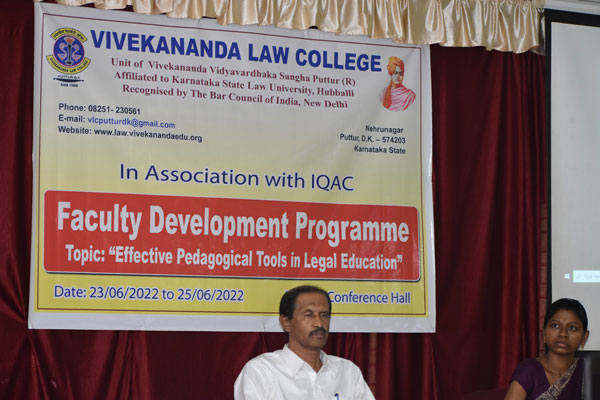
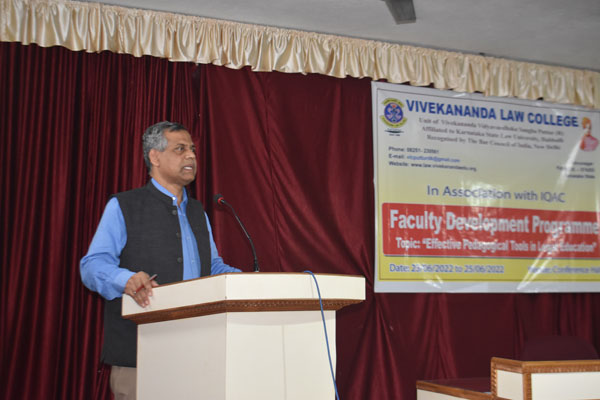
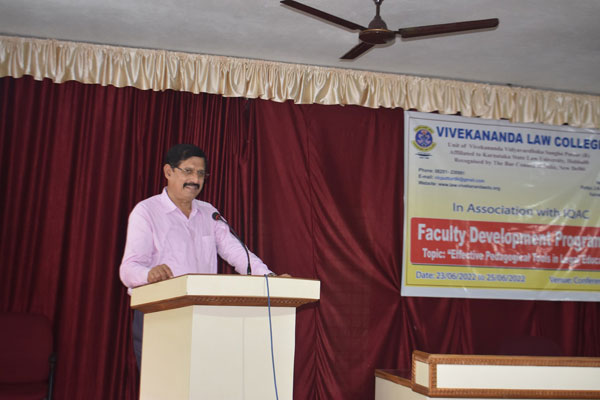
Objectives of the Faculty Development Programme
???? To obtain an in-depth understanding of various recent pedagogy of Law
???? To enhance the knowledge of evaluation standards and practices
???? To improve the research capabilities by understanding the elements of a good research proposal; qualitative and quantitative and data analysis tools and techniques
Vivekananda Law College in association with IQAC organized 3 days’ Faculty Development Programme on “Effective Pedagogical Tools in Legal Education”.
The Programme was attended by 30 participants. While designing the structure of the programme emphasis was given to the field of Law.
Day 1: 23/06/2022 – Inaugural Function
The programme started with lighting of lamp. At inaugural ceremony where Sri Sudhir Tholpady, Senior Faculty of Vivekananda Law College welcomed the gathering.
Sri Sripathi Kalluraya, President of Vivekananda Degree College inaugurated the programme and in his address said that learning is a continuous process. To be an effective teacher, one needs to be able to deliver the domain knowledge using the most suitable pedagogical tools. An effective teacher is also required to remain at frontiers of knowledge in his/her areas of subject expertise and gain working knowledge of other domains as Law is essentially interdisciplinary. He added that those who are in the teaching profession should always be open to questioning and answering the questions.
In his introductory speech, Dr. B.K.Ravindra, Director of Legal Studies said that the purpose of teacher vocational education is to assist them to teach effectively. The proper use of professional tools will help in to provide effective teaching to students while incorporating vocational skills and career skills.
Sri Vijaya Narayana K.M, Correspondent of Vivekananda Law College Governing Council in his presidential address said that effective teaching is possible if faculty retains the appropriate mastery of teaching , good knowledge and skills of modern technology.
Vivekananda Law College Principal Akshatha A.P. was present during the function. Assistant Professor Dr.Rekha K proposed vote of thanks.
Session I
Sri M V Shankar Bhat, Senior Advocate, Mangalore
The first session was on “The Need to Rope in Legal Professionals Such As Advocates in the Legal Education Sector”. By addressing the gathering, he said that academicians should concentrate more on practical aspects rather than the theoretical aspects of Law. Experience is highly prized by employers; not only does it improve communication and research skills, it also develops confidence and is a great test of academic ability. He gave many live examples of his own experience of 53 years. He stressed that a legal professional can be a teacher, litigating advocate, an employee in a corporate body.
Session II
Dr. K.R. Aithal, Former Dean of Law, Karnataka University, Dharwad
Topic: Enhanced qualitative and quantitative values in Legal Research
During his Interaction, Dr. Aithal discussed how law should be taught to the law students. For teaching, he should be a good researcher too. So, academician should inculcate research skills. Thereby he explained the various steps to be included in research. Research methods can generate different types of data. Depending on the type of research, a kind of data may be preferable to another.
Quantitative research methods are methods that mainly generate numerical data. The aim is to collect objective data to look for trends, patterns or correlations between two or more variables. Statistics show common themes in quantitative data.
Quantitative methods are measured by categorizing and rating the data collected by the researcher, e.g., how many students in a class enjoy playing a musical instrument. It is great for objective and easy analysis of data.
Qualitative research methods are methods that mainly generate descriptive, worded data. The aim is to collect in-depth and detailed data to understand as much as possible. Thematic analysis is an example of a qualitative analysis of data.
Qualitative methods can explore ideas, motivations, or thought processes in more depth, with a more personalized reflection of the studied person, e.g. to understand why students have chosen to play musical instruments. It is excellent for detailed data analysis and identifying additional areas of research quantitative data may not highlight.
Session III
Dr. Sandeep S Desai,
Professor&Dean Presidency University, Bangalore
Mr. Sandeep S Desai gave a talk on “Challenges in the Execution new paradigm in legal Education and Teaching Methodology by the Law institutions”
More emphasizing on methodology, that can be used by a law academician in present scenario. He expressed his view on what the best law teachers do, what personal qualities do the best law teachers possess, what do the law teachers expect from their students, how best law teacher prepare to teach. The law academician should equip himself not only by teaching effectively, but by including assessment, curriculum support, leadership and mentoring.
Session IV
Prof.Dr. Suresh V Nadagouder
Principal & Dean,Faculty of Law, University Law College & Dept. of Studies in Law, Bangaluru.
He started the discussion on “Significance of NEP in the Present Scenario”, by saying that NEP, was framed in 1986, and it was modified in 1992. So, it has been in existence for at least three decades, and during this long period, the country and the world’s society and economy have changed massively. So, India’s education sector needed to update itself according to the 21st-century requirements. The new policy, released on 23rd September 2020, will focus on innovation, research, and quality to fulfill India’s dream of becoming a knowledge powerhouse. As far as higher education is concerned, we can look forward to many innovative reforms. Some of the significant improvements are seen in financial, administrative and academic autonomy sector. E-course will also begin in regional languages for the convenience of students and the development of virtual labs will take place along with the establishment of a National Educational Scientific Forum. Rules will be uniform for all private, government, and deemed academic institutions in the country. He also said that NEP is not applicable for law colleges so far.
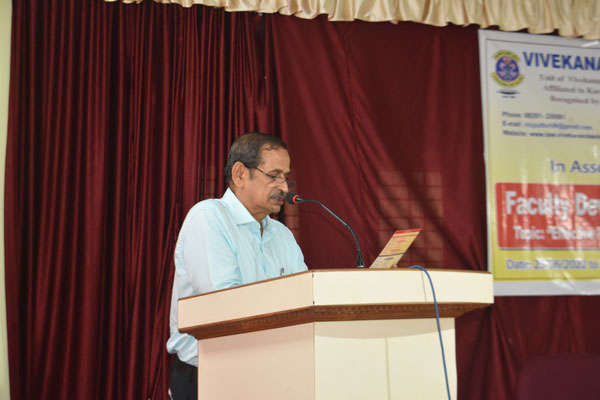
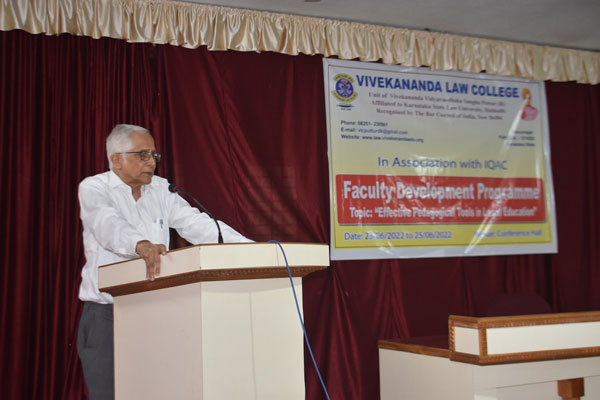
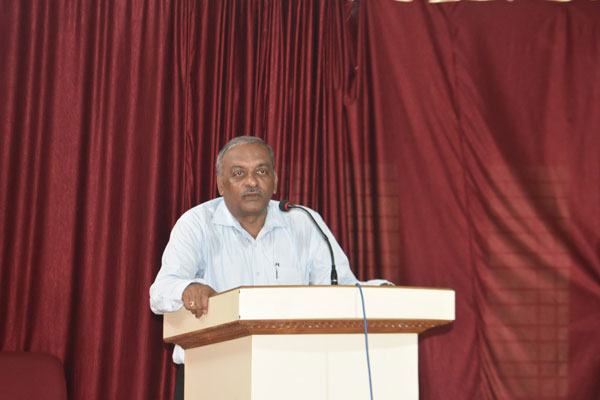
Day 2 : 24/06/2022
Session I
Sri Rammohan Rao, Senior Advocate, Puttur
The session was on “Role of Advocacy skills in Legal Profession”. He said that, Advocacy is a skill.When a legal advisor puts forward a particular argument to a court with a view to persuading the court to come to a decision favourable to their client that is advocacy. However, advocacy can be both written and oral, and in actual fact it encompasses a whole range of skills which are invaluable to lawyers. An advocate is specially trained in the technical profession of ‘law’, and with his grasp over the subject matter; professional function consists largely of providing counsel for clients about how to escape or mitigate the incidence of the law’s obligations, availing of the loopholes and the ambiguities of law. To ensure justice to poor and marginalized sections of the society, an Advocate is required to provide them legal assistance even when they are not in position either to pay him at all or adequately pay him for his services.
Session II
Dr. J R Jagadish
Principal, National Law College, Shivamogga
Topic: Surveillance system and its effect on Human Privacy
Dr. J R Jagadish expressed his views on the above topic by saying that, Communication surveillance in India takes place primarily under two laws – the Telegraph Act, 1885 and the Information Technology Act, 2000.While the Telegraph Act deals with interception of calls, The IT Act was enacted to deal with surveillance of all electronic communication. The very existence of a surveillance system impacts the right to privacy and the exercise of freedom of speech and personal liberty under Articles 19 and 21 of the Constitution, respectively. The fear of citizens knowing that their email is being read by the government may impact their ability to express, receive and discuss unorthodox ideas. In the absence of privacy, the safety of journalists, especially those whose work criticizes the government, and the personal safety of their sources are jeopardized.
Session III
Sri Krishnaprasad Nadsar
Correspondent, Vivekananda PU College
Topic: Inculcating Human Values in Family, Society and Educational Institutions
By addressing the gathering, he said that teachers play a major role in inculcating the ethical behavior of students. The education about constitution, particularly preamble; fundamental rights and duties gives out what values should be fostered through education. Educating the next generation helps fight back against ignorance. It helps people learn about the community at large and develop informed opinions on world issues. With educated opinions, we can support each other and make decisions that help establish a positive change in our communities. So, each academician should do self introspection about their lecturing quality, passionate about their profession, value added education. He concluded by saying that every academician should have the habit of adopting self efficacy theory.
Session IV
Dr. Santhosh Prabhu
Professor, SDM Law College, Mangalore.
The session was on “the Changing dynamics in the field of IPR with respect to NEP.
He said that, Intellectual Property Rights especially patents help in increasing innovation and technology diffusion. IPR protection helps firms to undertake R&D and recoup associated costs related to encourage innovation. IPR also plays a crucial role in international technology transfer and encourage innovation. Strengthening the IPR regime can enhance country’s growth and leads to higher growth in open economies. One of the objectives of NEP is that the NRF will work towards seeding, funding, coordinating, and monitoring research and innovation initiatives. It will also encourage research through merit-based peer evaluation of research projects along with incentives like awards for outstanding work.The collaboration between academia and industry envisioned by the NEP calls for a patent policy structure at the university level to facilitate more patent applications. Such a policy will safeguard interests of all the entities involved, provide for a research environment, and ensure compliance with the national laws and regulations. A larger number of patents with commercial benefits will serve as incentives for continuous and sustained efforts in research whereas legal system narrows down the scope of IPR. Concluding the session, opined that Law academicians should step up the quality of education by adding practical based class room environment.
Day: 3 – 25/06/2022
Session I
Dr. K.B. Kempegowda
Principal, Vivekananda College of Law, Bangalore
Dr. K.B. Kempegowda spoke on “Right to Information a tool for good Governance”. He started the session by saying that, “participation, transparency, legitimacy and responsiveness form the pillars of good governance. The concept of good governance was applied in India through the passing of Right to Information (RTI) Act, 2005, 73rd and 74th constitutional amendment”. He also added that, there is a close link between Right to Information and Good governance. Good governance is characterized by transparency, accountability and responsiveness. Human security, shelter, food, environment and employment opportunity are all bound up with Right to Information. In the absence of information on this issue, people can‘t live a dignified life and will remain ever a marginalized group in the society. It is a powerful instrument to protect the fundamental rights of people. Indian Parliament has passed Right to Information Act, 2005 to make government accountable, responsible, efficient and transparent in order to lead to good governance of the country.
Session II
Prof. K. Vasudeva
Director of Legal Studies, Vidyavardhaka Law College, Mysore
Prof. K. Vasudeva, took an interactive session on “Assessment and Evaluation of Students Learning”. The measurement of student learning through assessment is important because it provides useful feedback to both instructors and students about the extent to which students are successfully meeting course learning objectives. Student assessment also buttresses critical reflective teaching. Critical reflection on one’s teaching has a multitude of benefits for instructors, including the development of rationale for teaching practices, Student assessment, then, not only enables teachers to measure the effectiveness of their teaching, but is also useful in developing the rationale for pedagogical choices in the classroom. There are two kinds of assessment in the scholarship of teaching and learning. The first, summative assessment is assessment that is implemented at the end of the course of study. Its primary purpose is to produce a measure that “sums up” student learning. The second form, formative assessment, involves the evaluation of student learning over the course of time. Its fundamental purpose is to estimate students’ level of achievement in order to enhance student learning during the learning process. It’s the option of the law academician to adopt the form of assessment which is more effective.
Valedictory Function
At the Valedictory function, welcome address was given by Assistant Professor of Law Sri Koushik C.
Dr. K.M. Krishna Bhat Secretary of Vivekananda Vidyavardhaka Sangha was the chief guest. Delivering the closing remarks, he said that the role of teachers is very important behind the all round development of the student. A mother gives birth to a child but a teacher gives life to the child by inculcating good qualities, moral values. Further he said that professors should be able to effectively meet the present challenges of the changing times and also meet the expectations of students by using the digital pedagogical tools.
Suresh Rai Paddambail, Member of Governing Council presided over the function. In his presidential address he said that the vision of Law Faculty is to provide justice to the teaching profession by fuelling the students with knowledge, skills and confidence. The Attendees Dr. Rekha K, Smt. Sangeetha S.M, Smt. Subhashini J and Kumari Shree Raksha shared their feedback during the occasion.
The Chief Guest distributed certificates to all the participants.
Dr. B.K.Ravindra, Director of Legal Studies was present.
Vivekananda Law College Principal Akshatha A.P. proposed vote of thanks.
